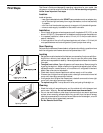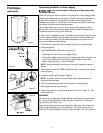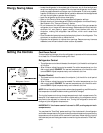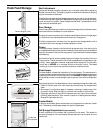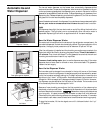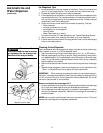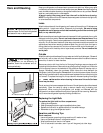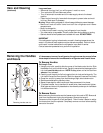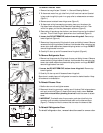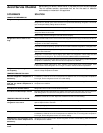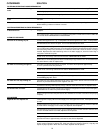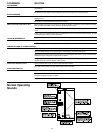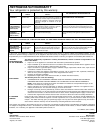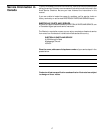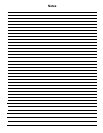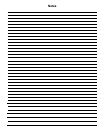
14
Weather is hot and humid which increases rate of frost buildup and internal sweating. This is normal.
Door is slightly open. See Occurrence section
OPENING/CLOSING OF DOORS/DRAWERS.
Door is opened too often or too long. Open the door less often.
Vegetables contain and give off moisture. It is not unusual to have moisture on the bottom side of
the cover.
Washed vegetables and fruits drain while in the drawer. Dry items before putting them into drawer.
Water collecting in bottom of drawer is normal.
Weather is humid. This is normal in humid weather. When humidity is lower, the moisture should
disappear.
Door is slightly open, causing cold air from inside the refrigerator to meet warm air from outside. See
Occurrence section
OPENING/CLOSING OF DOORS/DRAWERS.
Ice maker wire signal arm is in "up" or OFF position. Move wire signal arm to "down" or ON position.
Household water line valve is not open. Turn on household water line valve.
Water supply valve in refrigerator is being blocked by foreign material. Unplug the refrigerator and
turn off water supply. Slide refrigerator out and locate where water is connected to the valve. Unscrew
the brass fitting and pull out the screen from inside the valve mesh. Clean the screen of foreign
material. Replace screen and brass fitting and turn the water supply on; check for leaks. Plug in
refrigerator and slide into place.
Freezer is not cold enough. See Occurrence section
TEMPERATURES ARE TOO WARM.
Saddle valve on cold water pipe is blocked or restricted by foreign material. Turn off household water
line valve. Remove, clean or replace valve.
Ice maker is producing less ice than you expect. Ice maker should produce approximately
2 1/2 to 4 pounds of ice every 24 hours.
Freezer is not cold enough. See Occurrence section
TEMPERATURES ARE TOO WARM.
Household water line valve is not completely open. Turn on household water line valve.
Water supply valve in refrigerator is being blocked by foreign material. See Occurrence, "Ice maker
is not making any ice" above.
Ice maker wire arm is being held down by an item in the freezer. Remove item and release arm.
Remove any ice cubes which are frozen together over arm.
Ice cubes are not being used frequently enough. Remove and shake ice bucket to separate cubes.
Ice has picked up odor or flavor from strong food stored in refrigerator or freezer. Cover foods tightly.
Discard stale ice. Ice maker will produce fresh supply.
Water running to ice maker has poor taste or odor. Add filter to ice maker. Consult a water purifying
company.
Ice storage bin is empty. When the first supply of ice is dropped into the bin, the dispenser should
operate.
Freezer temperature is set too warm. Turn the freezer control to a higher setting so that ice cubes will
be made. When first supply of ice is made, the dispenser should operate.
Household water line valve is not open. Open household water line valve and allow sufficient time
for ice to be made. When ice is made, dispenser should operate.
Freezer door is not closed. Be sure freezer door is closed.
Ice dispensing arm has been held in for more than 4-5 minutes. Motor is overloaded. Motor overload
protector will reset in approximately 3 minutes. Ice can then be dispensed.
Ice has melted and frozen around auger due to infrequent use, temperature fluctuations and/or
power outages. Remove ice storage bin, thaw and empty the contents. Clean bin, wipe dry and
replace in proper position. When new ice is made, dispenser should operate.
SOLUTION
OCCURRENCE
Moisture collects on inside of refrigerator
walls.
Water collects on bottom side of drawer
cover.
Water collects in bottom of drawer.
Moisture forms on outside of refrigerator
or between doors.
Ice maker is not making any ice.
WATER/MOISTURE/FROST INSIDE REFRIGERATOR
WATER/MOISTURE/FROST OUTSIDE REFRIGERATOR
AUTOMATIC ICE MAKER
Ice maker is not making enough ice.
Ice maker will not stop making ice.
Ice maker is not separating the cubes.
Ice has bad odor and taste.
Dispenser will not dispense ice.
ICE DISPENSER



